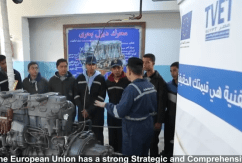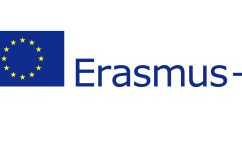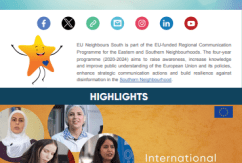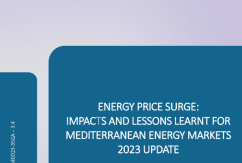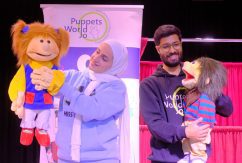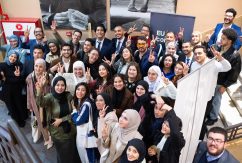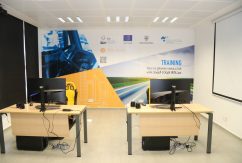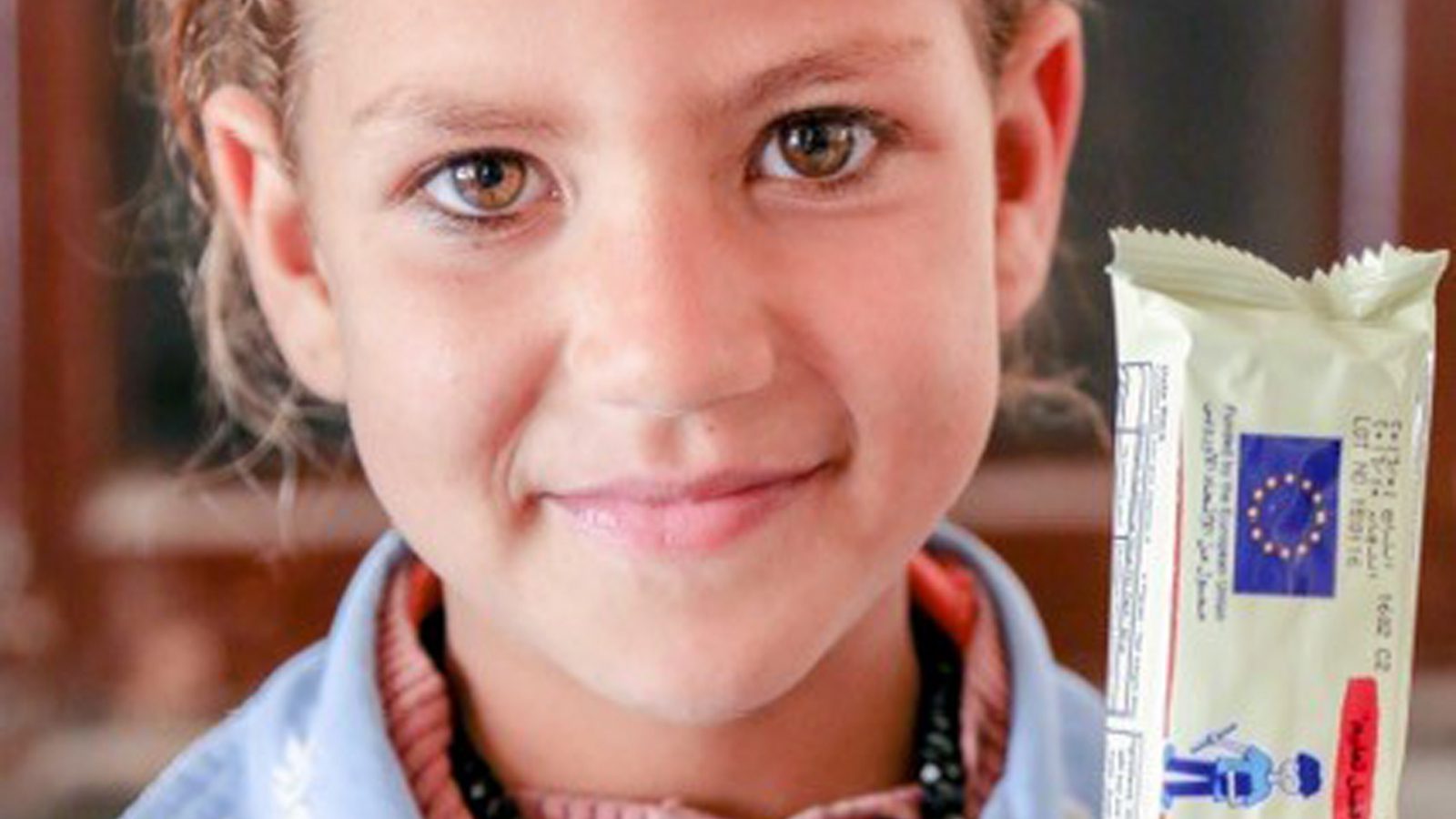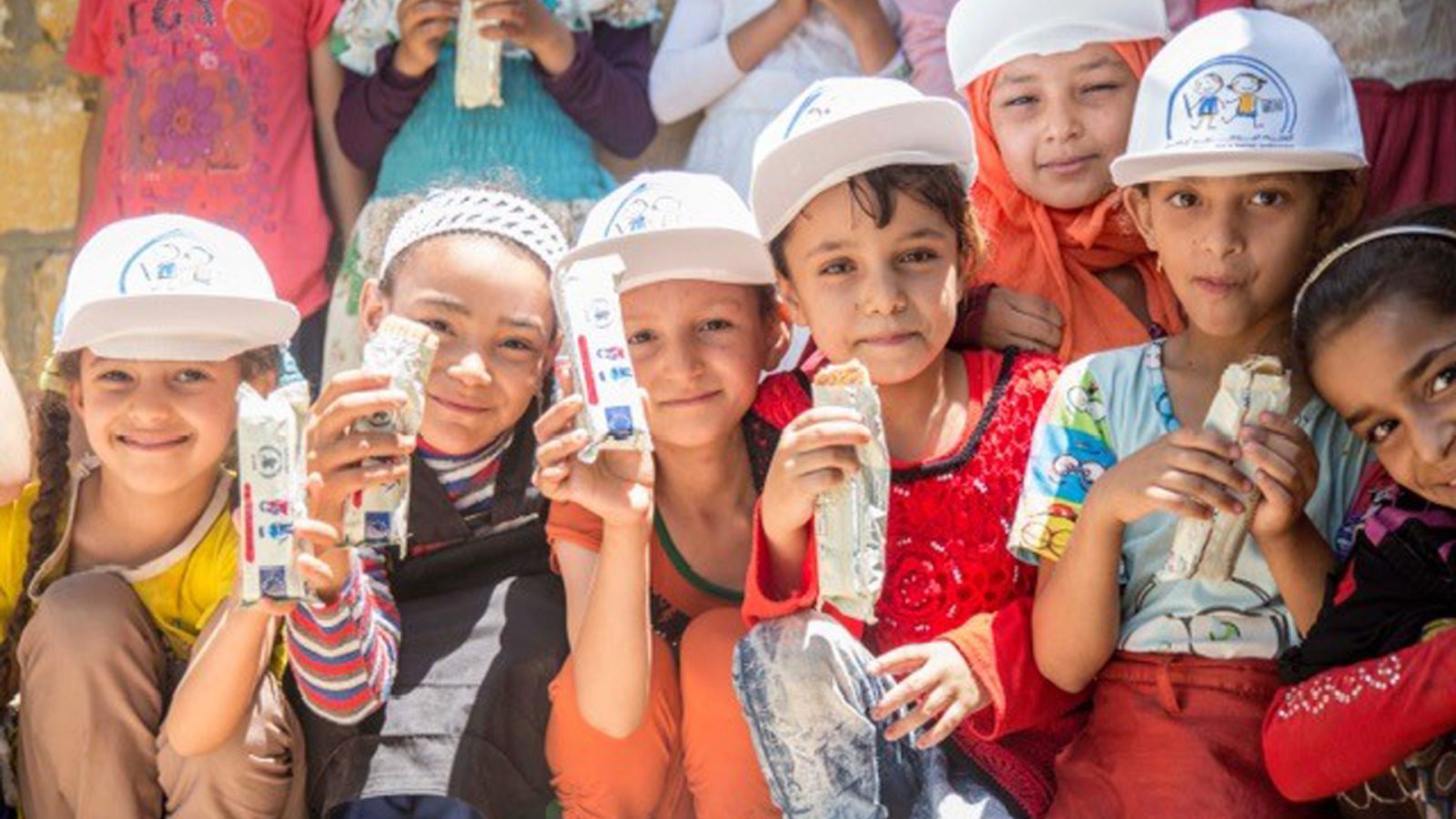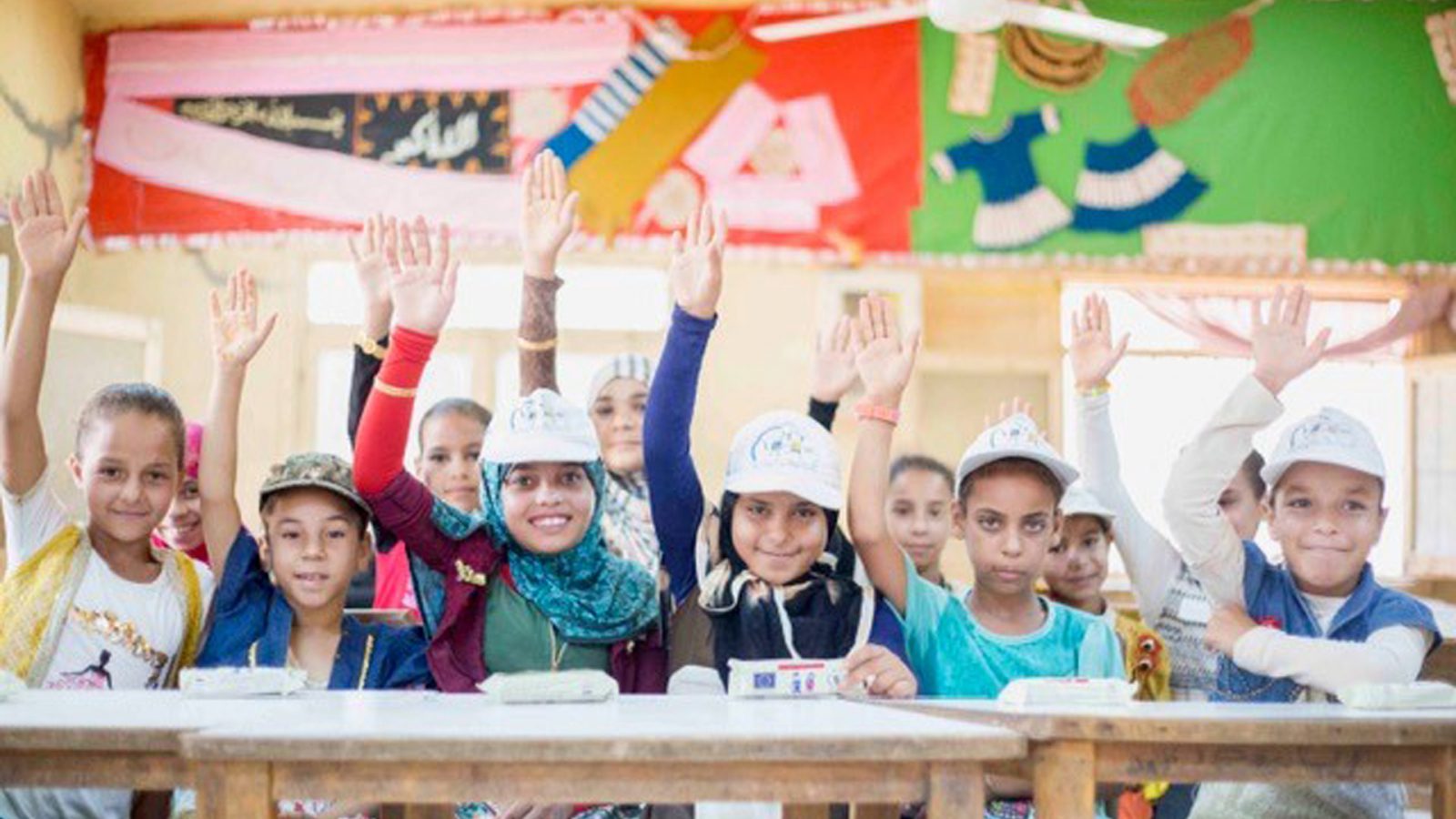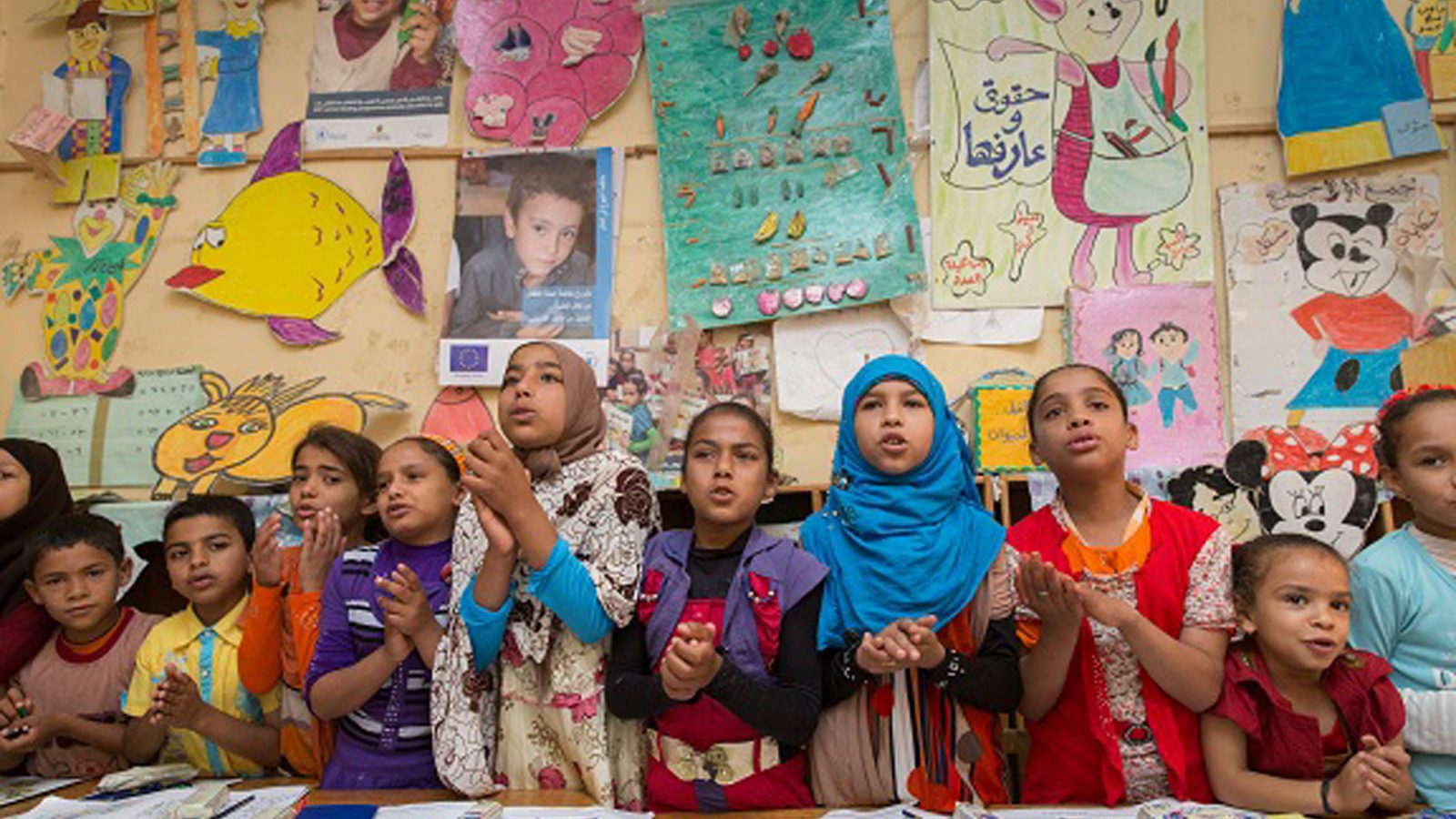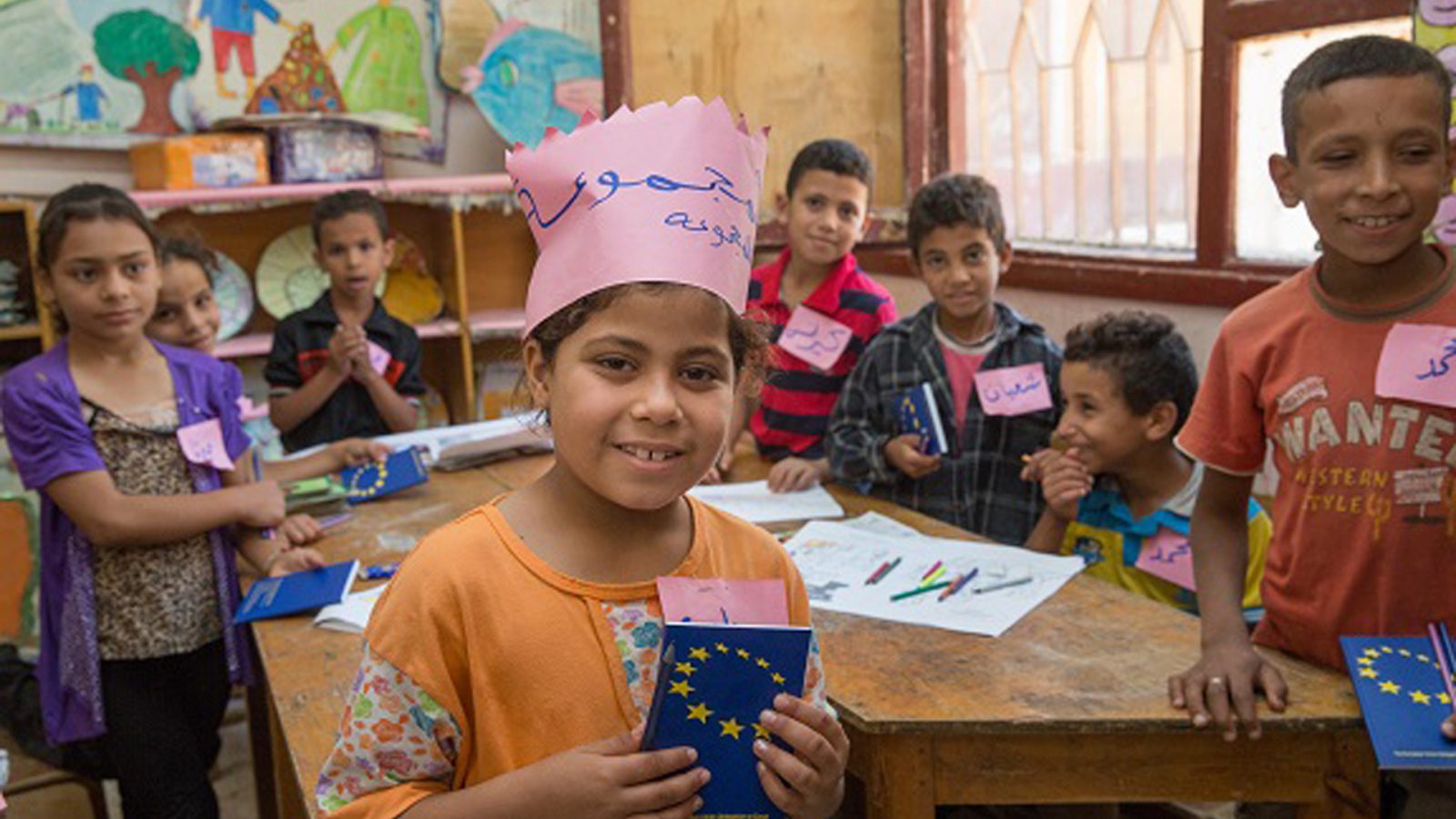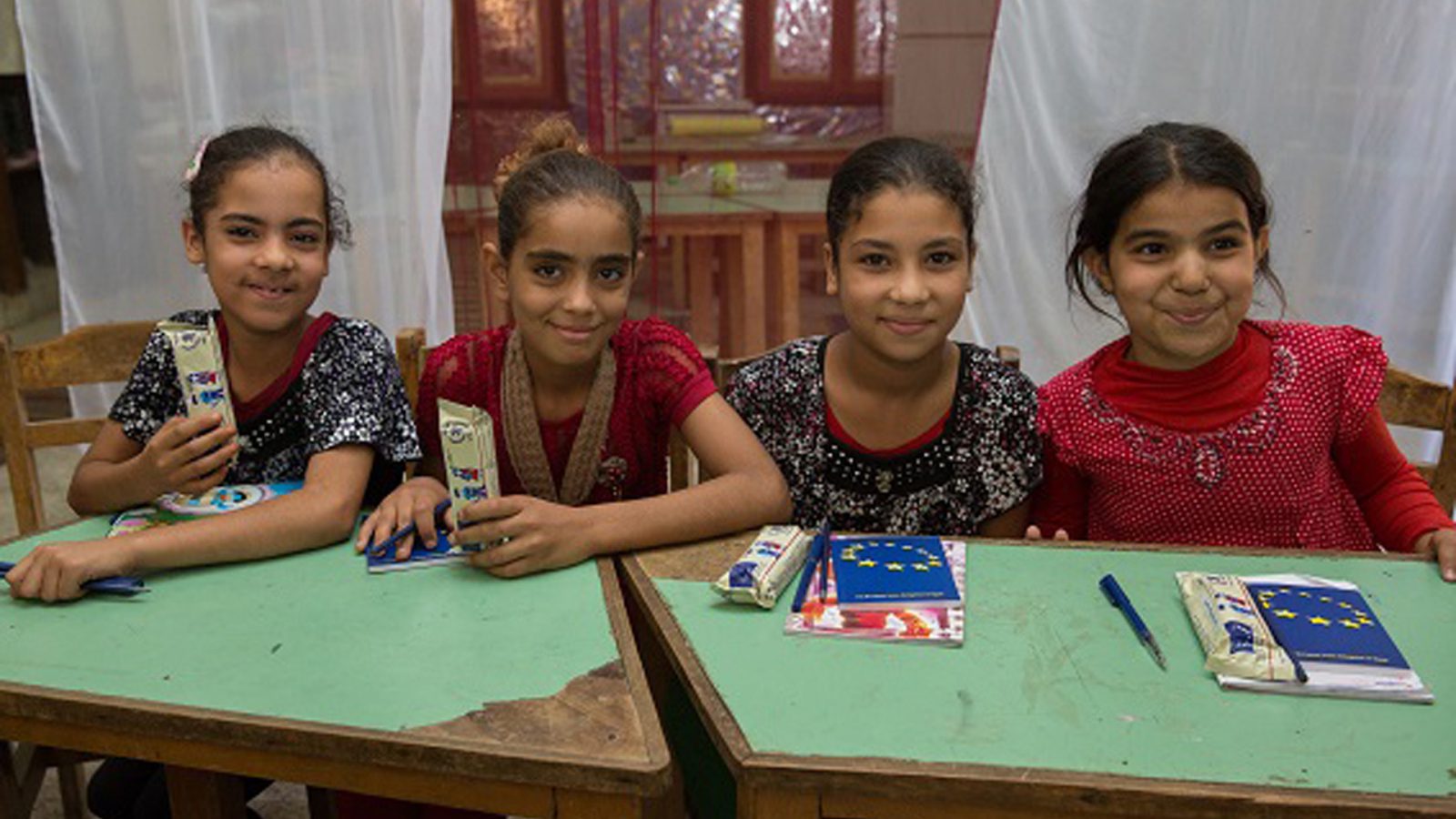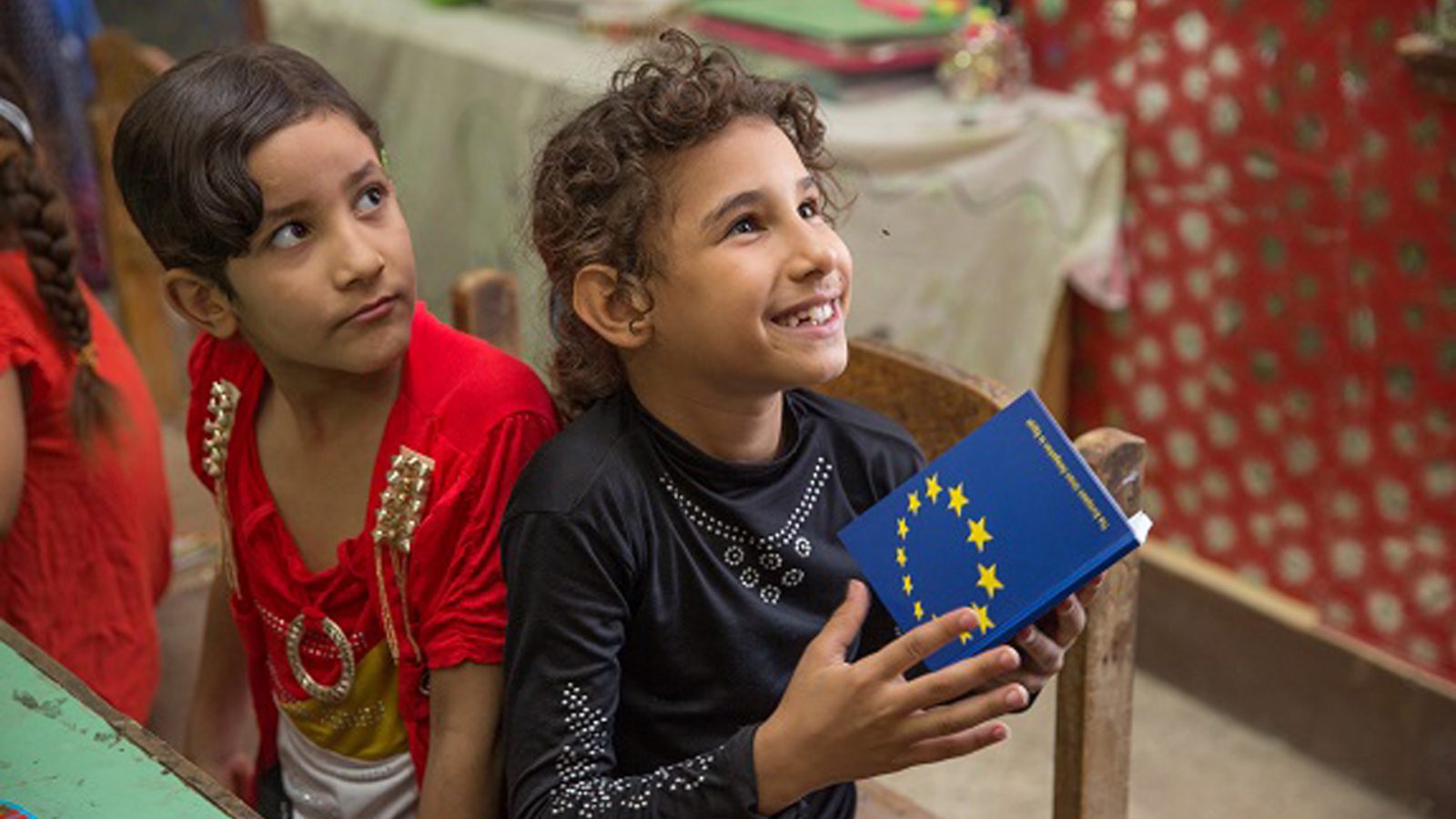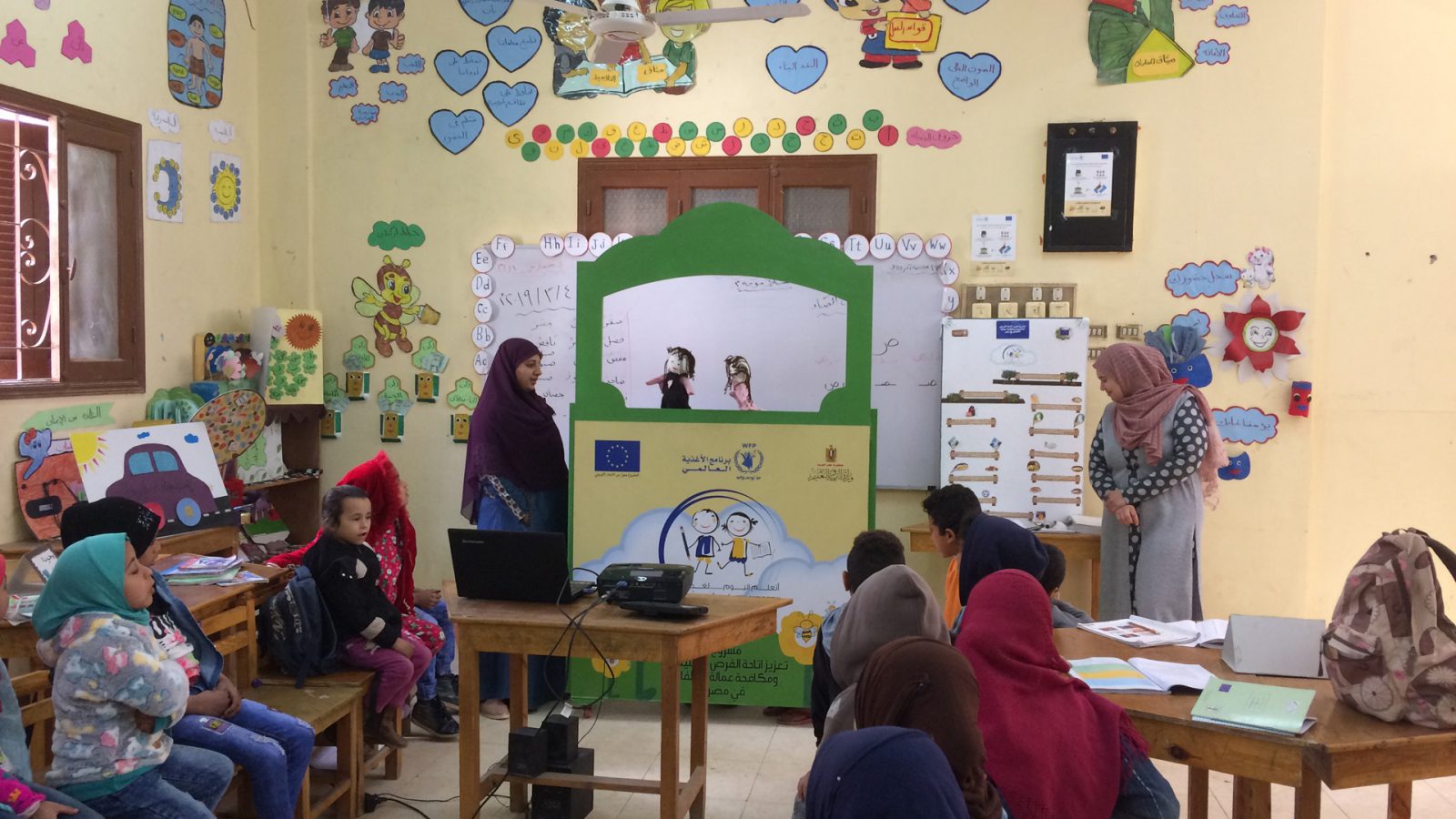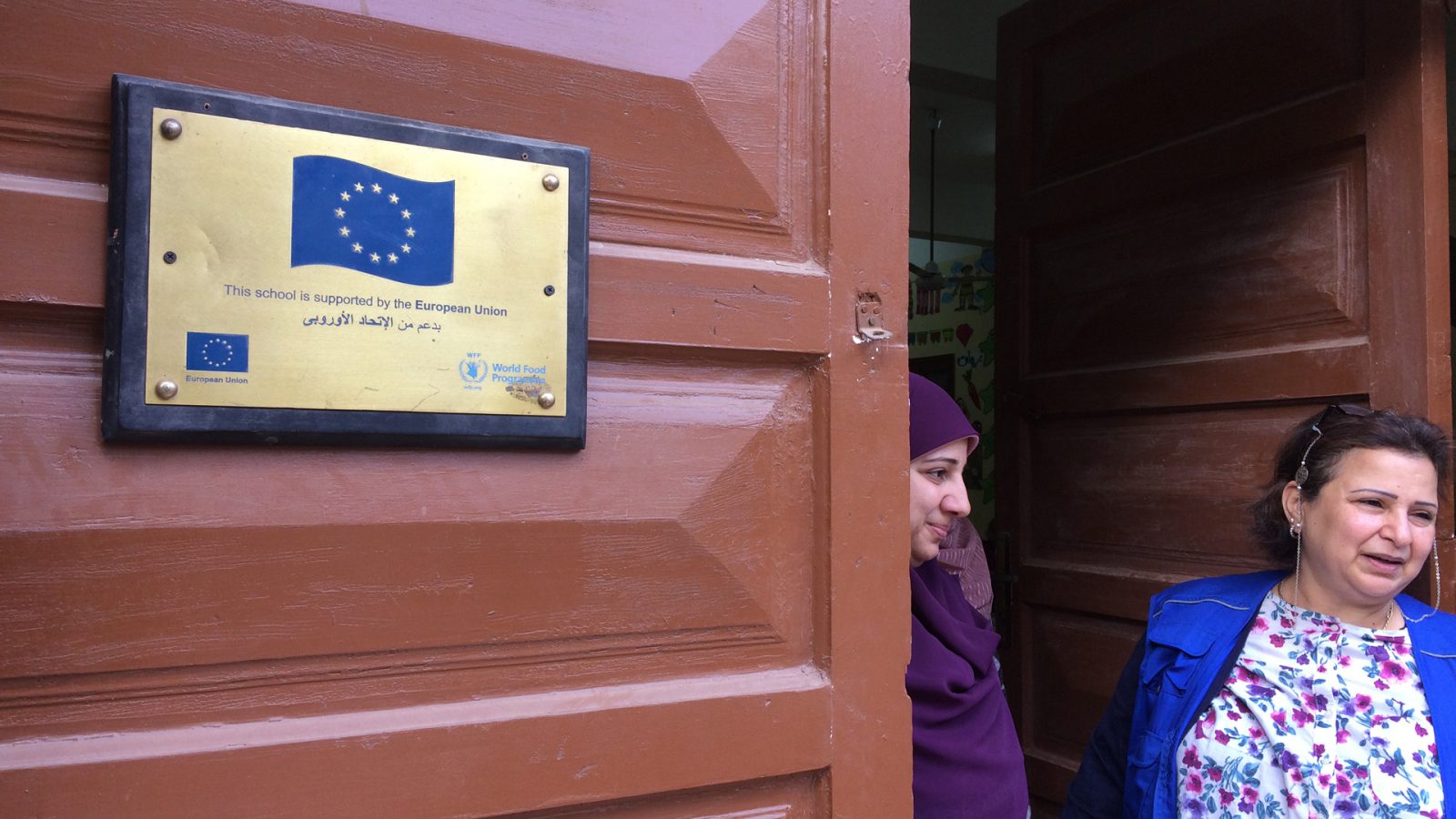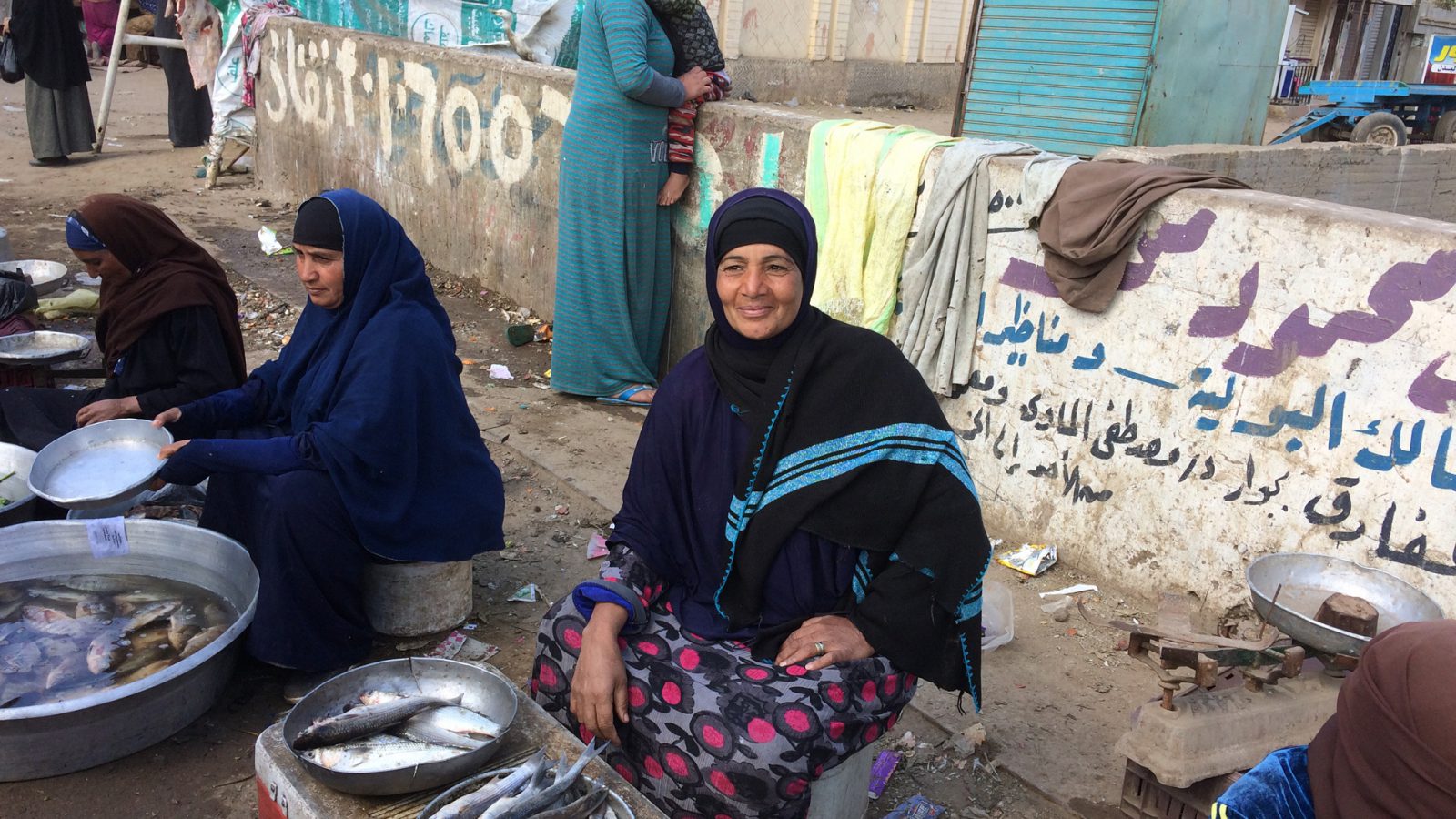A biscuit-flavored school
Since the partnership agreement was signed in July 2014 between the European Union and the World Food Programme (WFP) to implement the project ‘Enhancing Access of Children to Education and Fighting Child Labour’, a number of the most vulnerable governorates in Egypt have received 60 million euros of support for pupils remaining in community schools. This support has come through various forms of food and material aid aimed at combating illiteracy and fighting child labour and thus preventing school drop outs.
Scrabbles on the walls; small shops scattered here and there and houses that are distinguished only by the lack of planning in their construction, have each been built according to the family’s personal taste and limited means. There is nothing to disclose the history of the place. Although the establishment of the administrative district of Sinnouris, 88 km from Cairo, dates back to 1871, it now includes the poorest village in Egypt, Sanhour al Qibliya, according to recent development reports. This village is identified by the fact that most of its 150,000+ inhabitants work as day labourers and it has high rates of school drop outs and illiteracy. This is what makes it one of the strong candidates for getting the support of the EU project ‘Enhancing Access of Children to Education and Fighting Child Labour’.
Inside Sanhour al Qibliya School
Sanhour al Qibliya School, under the authority of the Ministry of Education, is one of 63 community schools within the district of Sinnouris, out of a total of 611 community schools in Fayoum Governorate, which is divided into seven districts. After the partnership agreement was signed by the EU and the WFP in July 2014, the 60 million euro EU-funded project ‘Enhancing Access of Children to Education and Fighting Child Labour’ implemented by the WFP, elected to support this group of schools in 16 Egyptian governorates until 2017. Because of the need for such work, the period of its application was extended to summer 2019 but recently its activity contracted to include nine governorates in the Delta and Upper Egypt.
The walls of Sanhour al Qibliya School are painted yellow and decorated with cartoon characters. One corner is for art activities, the other is for ‘learning through playing’; there is also a small puppet theatre and a small computer for showing videos to help remember letters and words. The boys and girls sit in a semi-circle around the two teachers. Not content to sit just passively, they participate enthusiastically in the lesson. Their ages range between 7 and 13 years old, which is a core age in the education process, as the teacher, Rania Abdulqawi, confirms. She has a diploma in community and education service and has received additional training through her work with the project. She started using a tablet eleven months ago. She says, ” It is mostly girls in the first primary section. There are 26 pupils of which there are just five boys, and some of the pupils are related. The oldest help the youngest, who sometimes learn better from them because they’re closer to them; this is known as peer learning. We teach Arabic and arithmetic and provide activities from 8am until 2pm. There is a break at 10:30am during which a free snack biscuit is given out. An external teacher comes to teach English twice a week. The puppet theatre is used to change behaviour with regard to things like cleanliness, integrity or truthfulness for example.
Daily and monthly food rations
In reality it is necessary for this kind of project to develop communities deprived of services, the economic level, level of subsistence, etc. The project started to give out daily snacks in the schools to provide children with approximately 25% of their daily nutritional needs. The ‘EU biscuit’, as the village calls it, contains vitamins and minerals mixed with a date paste (or ‘agwa’), prepared to a specific recipe and manufactured according to international standards in cooperation with specific local companies. Four portions of the bar are enough to satisfy the child’s appetite. Some of them take it home and sometimes they divide it with their siblings or eat it during the break from classes. In order to guarantee that children attend school regularly, the project provides monthly food rations to the family, about once a month. These rations contain 10 kg of rice and one litre of cooking oil. Since the activation of the computerised card system (CBT – cash-based transfers) two and a half years ago facilitating the distribution of the foodstuffs for each family through 18 approved traders in Sinnouris, other more varied foodstuffs have been added to this, such as pasta, tuna, honey, flour, lentils and fish. This is on the condition that the child’s attendance is not less than 80%. The WFP in Egypt also explained that, with the support of the EU they are trying to compensate for the income which the family would receive if one of its children was working. Through our work with 3,285 community schools in the other areas of Egypt, we have actually provided the service to 91,600 pupils and trained 8,800 teachers. Also, 52,200 mothers received 11,440 loans because their children go to school regularly. The WFP added that the community schools it supports are a special case, as they were established mostly through the personal efforts of some families or communities and are under the authority of the Ministry of Education. “Their classes have around twenty pupils of varying ages, which requires teachers to be flexible and adapt their interaction. Therefore, we wanted to train them to follow modern educational methods.”
13 year old Aya is the leader of the class today, as shown by the paper crown on her head. She couldn’t enrol in school when she was younger due to the death of her father and the fact that she had no birth certificate, but she is determined to obtain a certificate to enable her to teach others. Yumna is the youngest in the class at around seven years old. She is one of the outstanding students who is dreaming of studying medicine. The biggest troublemaker is 11 year old Ahmed, who sits away from the others. Everyone says that he is good with his hands as he put together a basic steam motorbike.
Umm Islam’s grocery
When the text message comes to his family or other families wanting to educate their children and complying with the conditions of the EU-funded project, they go immediately to one of the authorised distributors of the foodstuffs, one of whom is Umm Islam, who has run a grocery store for twenty years. Using a computerised card the amount requested is received, each with their share, which is up to EGP 180 from the start of the project. In the words of the project beneficiaries in Sanhour al Qibliya, “This is definitely going to leave a gap when it ends.” Since her participation in the project, the number of repeat visitors to Umm Islam has increased – the end of the project may affect her business but her task is to keep these repeat visitors.
The EU-funded project cooperates with field work specialists. They play the role of connector between the communities and local schools and the researchers in Cairo who put in place the work plans according to the needs of each governorate. Neven Adib Samuel, a specialist in social and development services, has been a good leader in this role since 2016. She comes from Fayoum Governorate and knows the details of their life from dealing with people there. She sets out the different stages of the project: distributing household rations; maintaining and distributing tablets or smartboards for teachers; confirming attendance rates; updating CBT cards used for obtaining the foodstuffs allocated to each family, etc. Neven also described the success stories of some of the former pupils of these schools, ” One girl became a surgeon in Fayoum General Hospital, another became a footballer while he was in secondary school, and another was rescued from ideas of revenge and entered the Arts Faculty.”
She has so many stories to tell. People also flood to her asking for loans and the possibility of setting up a small business, as the EU/WFP project has increased expectations, opportunities and dreams. We can see this clearly just by going into Sanhour al Qibliya School, which is part of the Misr El Kheir Foundation. This is because, after working on the ground for a while, the EU project to combat school dropouts, decided to provide soft loans to mothers to enable them to set up small businesses and work. This helps them meet their daily needs and thus they are not reliant on their children working to augment their income.
Fish is livelihood
Nimat Ibrahim, 45 years old, has been selling fish for over thirty years, contrary to many women in the village who don’t work. She spreads herself out on the ground close to Sanhour al Qibliya market. She has laid out in front of her a variety of fish: tilapia, sea bream and shrimps; which are all laid out on a small red fridge next to a set of scales. ” I got a soft loan of EGP 3,500 (180 euros) to help me buy the scales and the fridge, which makes my job easier. Previously I had to try and get rid of all the fish I had by the end of the day but now, thanks to the fridge, I can keep anything left over until the next day. Since I put my little girl into school I have the right to participate in the training available to parents in my situation, especially mothers, and on top of that, I got a loan.” Nimat added, “I pay off the loan over 15 months, in other words I pay EGP 258 per month, which is a small amount which gets me out of a fix.”
Whilst Nimat told her stories, her face beamed with a huge smile despite the fact that she looks older than her real age. She talked about her older sons, ‘the boys’, who went to Aswan to work in fishing, but her smile widened as she talked about her younger daughter who enrolled in school and has successfully reached primary grade six. She said, ” I hope that she completes her education as long as I’m alive. She’s the one who reads the names of medicines and treatments. She has learned the difference between right and wrong at school. Her brothers are scared for her but I insist that she doesn’t meet my fate.” The daughter is dreaming of becoming a doctor; such as other young villagers like her at Sanhour al Qibliya School. This community school is not just seen as a place where children are educated but as a pivotal point of life for many families, whose circumstances have been changed thanks to the support of the EU project. There is now hope of a different future. This is explained by Rawiya Gamaat who says that every time she looks at her granddaughter, who is holding a handful of green beans, she sees in her this future. Rawiya has two girls in the school. Because they are regularly attending school, she has claimed her right under the project to receive the training for mothers, and therefore she received material support which enables her to achieve some kind of stability. She divided the money from the loan, under the micro credit scheme of the project, between herself and her husband. He bought a horse-drawn cart to buy fruit and vegetables and she distributes and sells the goods with him a few yards from the school on drizzlywinter mornings. It has changed the life of parents and the future of their children.
EU Neighbours Links
Twitter 1
Twitter 2
Twitter 3
EU Delegation
